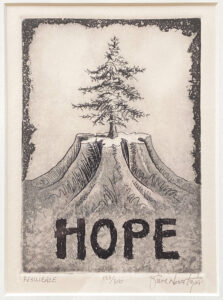“Champions of Nuance and Empathy”
On September 21, I received a thank you note in honor of the International Day of Peace. This note was from a member of the American Friends of the Parents Circle, a Families Forum of Palestinian and Israeli Bereaved Families for Peace*. I had begun monthly donations to this group several years ago. I saved the thank you note and kept it on the top of the file cabinet in my office. Then on October 7 came the attacks on Israel!
Four other sources inspired this month’s post.
I listened to an interview with the neuroscientist Lisa Feldman Barrett on the Huberman Lab podcast broadcast on October 16. I had recently read Dr. Barrett’s most recent book, 7½ Lessons About the Brain. (I’m currently taking a class from The Neuroscience School and that’s where I learned of this book.) Dr. Barrett’s words resonated with me immediately. “Authoritarian thinking is the reduction of complexity to things that are really simple.” Authoritarians reduce things to black and white and either/or thinking. They avoid complexity so there can be simple answers to everything.
We see that type of thinking in our own country as well as the most recent conflict in Israel and Gaza.
On November 4, I heard Scott Simon’s interview on NPR with Susannah Heschel and Tarek El-Ariss, two professors at Darmouth College who have for many years put on forums from the Jewish Studies and Middle Eastern Studies programs to answer questions about the conflict and its roots in history. I was struck by Professor Heschel’s answer to Scott Simon’s question: “If there’s one thing you could isolate now to tell all of us during this time, what would that be?”
Her reply, “I want people to think in complex terms, not to be satisfied with the reductionist approach, to place the present in a larger context of the past but also, as we’ve been saying, to think about a better future to imagine it.” This response is the opposite of what Dr. Barrett describes happens with authoritarian thinking. Our world is filled with complexity, not simple answers.
On November 8, David Remnick, editor of The New Yorker and host of The New Yorker Radio Hour podcast spoke about his recent trip to Israel with Brook Gladstone, host of On the Media. Remnick also speaks of complexity! I invite you to listen to his perspective.
On November 8, I read Nicholas Kristof’s column in The New York Times, “Meet the Champions of Nuance and Empathy We Need.” This piece included an interview with an Israeli woman, Meytal Ofer, he had met several weeks ago. Ten months earlier two terrorists from Hamas had murdered her father with 41 blows of an ax. Shortly after her father’s murder she joined the Parents Circle, the group I mentioned at the beginning of this post. She said, “We have to do something. You cannot stop violence with violence. We tried it for 100 years, and it’s not working.”
Kristof’s column concluded with these comments after talking with others like Meytal Ofer. “I am grateful to them for providing moral leadership that so many presidents and prime ministers have not. I don’t know if they can actually succeed in blazing a path to peace, but we need such champions of nuance and empathy if we are to find any hope of moving forward.”
I recently heard a coach say that “Learning is the nuance.”
Are you willing, just a few days before our Thanksgiving holiday, to become a champion of nuance and empathy by supporting the American Friends of the Parents Circle?
One small step for hope…
* “The Parents Circle Families Forum is a joint Israeli-Palestinian organization made up of more than 600 bereaved families. Their common bond is that they have lost a close family member to the conflict. But instead of choosing revenge, they have chosen a path of reconciliation.”
